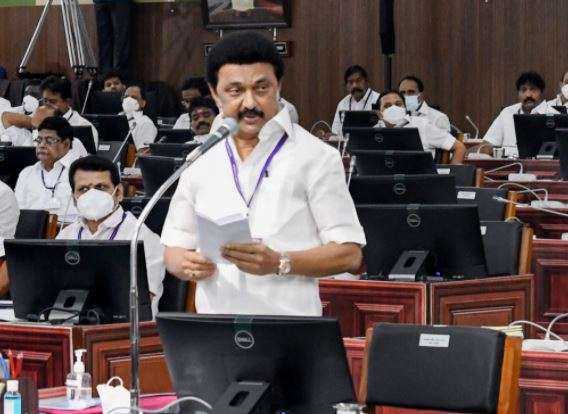
Explanation: Tamil Nadu government’s bill against NEET
The National Eligibility-cum-Entrance Test is not a fair or equitable mode of admission as it favors the wealthy and elite sections of the society, says the preamble of the bill to override NEET, which was passed in the Tamil Nadu Assembly on Monday. Entry 25 of List III of Admission to Medical Courses can be traced to Schedule VII of the Constitution and hence the State is competent to regulate it, Statement of Objects and Causes of the Bill (SOOAR) TN legislature to enact legislation Speaking on the potential, said on this subject. It said that students from the affluent class go abroad for higher studies after MBBS and the number of doctors serving in the state is decreasing.
Read more: Tamil Nadu: NEET aspirant dies by suicide hours before appearing for exam
what does it say
- Referring to a high-level committee headed by Justice AK Rajan, retired judge of Madras High Court, the Preamble said, the panel on conducting a detailed study concluded that if NEET continues for a few more years, Tamil Nadu The health care system of the U.S. would be badly affected and there would not be enough doctors for posting in primary health centers or government hospitals and the rural and urban poor would not be able to attend medical courses.
- The Bill, which was introduced in the House on the basis of the panel’s report, recommended that “the state government may take immediate steps to eliminate NEET in admission to medical programs at all levels by following necessary legal and/or legislative procedures”. Is.”
- From the committee’s report, it became clear that “NEET is not a fair or equitable mode of admission as it favors the wealthy and elite section of the society.” Further, the mere abolition of the Common Entrance Test does not weaken or affect the standard of medical education, the preamble states.
- SOOAR said that the panel in its finding pointed out that NEET has undermined diverse social representation in MBBS and higher medical studies, mainly in favor of the affordable and affluent classes, while pursuing medical education. The dreams of the marginalized social groups have been thwarted.
- Analysis of socioeconomic and other demographic status (SEODS) of those competing for medical education has proved this fact.
- In medical education, NEET has left representation of social and other demographic groups with low SEODS.
- Most of the affected social groups were Tamil medium students, rural background from government schools, parents’ income below Rs 2.5 lakh per annum and socially depressed and disadvantaged groups such as most backward classes, scheduled castes and scheduled castes. Tribe, SOOAR, citing the panel’s findings in detail, said.
- “Therefore, the committee concludes that NEET is against these disadvantaged groups.” NEET, in its own right, does not ensure the merit or standard of students who are eventually offered MBBS seats.
- Findings show that NEET has enabled and empowered only relatively low performing students (in NEET scores and class XII scores) to get admission in MBBS. “Therefore, the question of NEET should be ruled out to ensure the quality and merit of the students.”
- Comparatively, it is observed that the marks based admission of class XII during the pre-NEET period ensured the admission of quality and meritorious students.
- Even before 2017, TN had the largest number of medical and dental educational institutions and a high level of graduate students. Admission on the basis of class XII marks will not in any way lower the standard of education as the higher secondary syllabus is of sufficient standard.
- Opposing the contention that NEET has improved the standard of medical education, the statement said that the standard of medical education is maintained during the UG course by following the syllabus prescribed by the National Medical Commission and students who pass the university are not able to pass the exam, they are not awarded the degree.
- “Therefore, it is not during the admission phase that the standard of medical education is maintained.” “It is clear from the panel’s report that NEET is not a uniform method of admission. The experience of the last four years of NEET has shown that the examination has shattered the hopes and dreams of the students of Tamil Nadu, who specialize in medical and dental practice. courses, students from socially and economically backward classes,” the statement said.
- NEET has put a huge financial burden on the students from socially and economically backward classes. “It promotes inequality, as it favors the affluent and more privileged sections of the society, who are able to afford specialized coaching, apart from pursuing CAS XII. It also affects social groups deprived of medical and dental education. This is against the basic purpose of equality clause enshrined in the constitution and it also violates the right to education of the children of these deprived section of the society.
- “Students from the rich class, after completing UG courses do not serve in rural areas and they often pursue PG courses abroad. “Thus the number of doctors serving in the state is decreasing.”
- After considering the recommendations of the Committee, the Government stated that in order to ensure social justice, it has been decided that admission to UG courses in Medicine, Dentistry, Indian Medicine and Homeopathy in Tamil Nadu will be based only on the marks obtained in Higher Secondary. Will be done. Exam, Class XII or Plus Two.
- Barring the BJP, all other parties in Tamil Nadu are opposing NEET and the issue has become politically sensitive in the years since the suicides of 15 candidates so far.
Read more: NEET 2021: Tamil Nadu Assembly passes bill for opting out of medical admissions
.